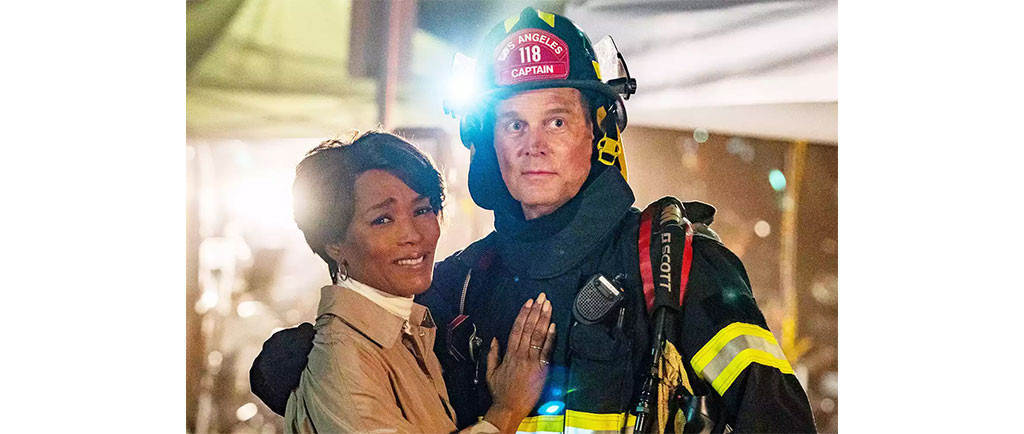
When Cell Towers Fail: St. Louis Residents Race to Build an Emergency Safety Net
Help Bring Free Emergency Walkie-Talkie-Like Service to Black St. Louis, Donations and Tower Space Needed In the heart of St. Louis, a group of dedicated

Photo: © Fox. Angela Bassett and Peter Krause in 9-1-1, “Defend in Place” episode (2021).
Our perceptions are constantly shaped by the media we consume—especially in Black communities. From TV shows to movies, the way Black life is portrayed influences how we see ourselves, each other, and the world. Media doesn’t just entertain; it programs behavior. Many believe they are immune to media influence, but psychological research and media studies consistently show the opposite. As Noam Chomsky argues in Manufacturing Consent, media doesn’t just reflect reality—it manufactures it.
So the real question is: What messages has Hollywood been selling to Black audiences all these years?
Below are recurring themes and tropes we’ve observed in how Hollywood scripts Black people. Ask yourself: What impact do these portrayals have on the Black psyche? And what outcome might they be designed to produce? We offer our input.
1) Hollywood Portrays Blacks as Happier Dating White Than Black to Taint Perception of Black Love
Hollywood writers often portray Black individuals as happier when written dating white partners, while Black couples are frequently depicted amid dysfunction, betrayal, sadness, or despair. This subtle but persistent narrative sends a psychological message: that Black love is inherently troubled, while interracial relationships—particularly those involving white partners—offer peace and happiness.
This conditioning, when absorbed subconsciously, can damage how Black people relate to one another in real life, weakening the vibrancy of Black relationships. It’s reminiscent of past psychological warfare, such as the “Curse of Ham” myth, which falsely claimed Black skin was a punishment from God—damaging generations of Black Christian identity.
Common Hollywood tropes include:
The TV show 9-1-1. featuring Angela Bassett, is a perfect example. The show starts writing Basssett having a Black husband to begin the series. Then they write her Black husband going gay. Then write her going to a white man. What actions are the writer seemingly trying to suggest?
When movie and TV scenes do not reflect reality, Hollywood is attempting to manufacture reality. This is at the heart of its Anti-Black-Family agenda.
2) Hollywood Writers Show a Preference for Depicting LGBTQ+ Black Love Over Heterosexual Black Love
Hollywood increasingly showcases LGBTQ+ Black relationships with warmth and affection, while heterosexual Black relationships are often written as cold, strained, or dysfunctional.
Actor Terry Crews once said, “There are forces that don’t want Black men and women to unite.” Hollywood’s disproportionate emphasis on LGBTQ+ Black storylines—while underrepresenting healthy Black families—suggests a disinterest in portraying strong Black heterosexual bonds.
To be clear: we acknowledge and respect our LGBTQ+ brothers and sisters. This critique is not about judgment, but about honestly asking if Hollywood has an agenda. The truth is, most Black Americans are heterosexual. So if Hollywood refuses to reflect that reality, we must ask what exactly are they doing? And why?
3) The Neutering of Black Masculinity
Black men are routinely scripted as weak, goofy, or non-masculine—either as comic relief, cowardly side characters, or the first to die in action and horror films. These portrayals are crafted to instill the idea that Black men cannot leader and the illusion that we are incapable of strength – even though we taught the world math and built pyramids on many continents before the our high scientists went into seclusion (the Black Panther film told part of this truth). Depicting Black men as weak, goofy, or threatening is a calculated effort to erode Black women’s respect for Black masculinity, while also undermining the confidence and self-image of Black men who see themselves represented as ‘weak’ on screen.
4) The “Self-Sacrificing Black” Trope
A recurring theme in Hollywood is the Black character sacrificing their life or well-being to protect white characters or their interests. This dynamic rarely reverses and serves to embed the idea that white lives and causes carry more value than Black lives and causes. In short, white interests are worth protecting—even at Black expense.
5) Inserting White Characters Into Black-Centered Stories
Even in shows or movies led by Black casts, Hollywood almost always inserts token white friends, love interests, or savior figures. The underlying message is: Black success needs white validation, and Black communities cannot do anything on their own.
Pull Quote: Nothing in film is accidental. Everything is directed. We must always ask: Why was that character written this way? What ideas are they trying to inject into our minds?
6) When Blacks Protest Politically, Hollywood Shows Strategic Tv Shows and Movies
Whenever Black communities rise up—such as during the Ferguson protests after Michael Brown’s murder—Hollywood responds with programming that steers Black’s attention away from the movement: slavery films, trauma films, or “forgiveness” stories. These serve to:
• Reopen historical wounds;
• Suggest that “it could be worse” so why protest;
• Nudge activism into more passive, less effective political strategies.
Take The Hate U Give, where the politically aware Black woman was romantically paired with a white partner. The subtext basically was implying: You can fight for Black issues while Still Dating the Folks You’re Fighting Against. It was masterful propaganda.
7) Hiding Anti-Black Messaging Behind Black Faces
A Black cast, a Black director, even a Black producer doesn’t guarantee a film supports the Black community. Hollywood increasingly places Black creatives at the helm of projects that still push anti-Black-family themes. This tactic deflects criticism by making it seem as if objections are attacks on Black talent—when the real influence is coming from higher up.
There is often a figure in the production—unseen, unaligned—whose job is to ensure certain messages make it into the final cut.
8) Promoting Fringe Representations of Blackness
Hollywood elevates extreme or fringe depictions of Black life—hypersexual behavior, eccentricity, or distorted gender roles—as representative of the norm. This blurs the public’s perception of Black identity as some Blacks begin to copy the weird characters depict onscreen, especially among youth.
9) Black Love Celebrated Only in Service to Power Structures
Black couples are most positively portrayed when they serve in the military or police—institutions that have historically suppressed Black progress. This suggests that healthy Black relationships are only possible when aligned with systems of white control.
10) Rewarding Narratives That Depict Blacks How They want to See Us
Hollywood often awards performances that degrade Black dignity:
As the rapper Jadakiss once asked:
“Why Halle have to let a white man pop her to get an Oscar?
And why Denzel have to be crooked before he took it?”
These are not coincidences—they’re signals. Hollywood uses awards as reward-based positive reinforcement training. In other words, ‘Here’s a cookie. Because this is how we want you to teach other Black people to act.’
Conclusion: The Psychological Toll of Hollywood’s Anti-Black-Family Narrative Campaign
What impact has decades of distorted storytelling had on the Black psyche? Has it been used to:

Help Bring Free Emergency Walkie-Talkie-Like Service to Black St. Louis, Donations and Tower Space Needed In the heart of St. Louis, a group of dedicated

Thinking about going vegetarian or vegan? You’re not alone. Every year, more people are making the move toward plant-based living to improve their health, support

In recent years, a powerful shift has been taking place across Black communities in America—more and more Black Americans are turning to vegetarianism as a